- Home
- Joy Dettman
Wind in the Wires Page 4
Wind in the Wires Read online
Page 4
‘I had a good time,’ he said.
‘Me too. Thanks.’
She got the motor going, but he hadn’t closed the door. She turned to him, waiting for him to close it. Knew he probably wanted to kiss her. His was a kissing sort of family. Katie had kissed her when they were leaving, his father had kissed her and told her he’d always had a soft spot for good-looking redheads.
They thought she was Jack’s girlfriend. And she wasn’t. Maybe that was what was wrong with her, maybe tonight she wanted to be his girlfriend. Maybe she wanted to be Gina – or someone other than Georgie Morrison.
‘See you,’ she said. He closed the door, which took two slams to click it. She backed out, whacked the gear stick into first and drove towards home.
Home? It wasn’t, not any more. Charlie’s shop was about as close as it got to home these days. She slept in Granny’s old bedroom. The working bee had ruined it with windows but she’d tacked old blankets over them to bring back the dark to that room.
Had to admit she liked electricity. Would have liked to see a bit of it shining as she drove down the track. No light left on to greet her.
The lights had been on at Jack’s hotel when they’d driven in and his parents sitting on their front veranda waiting for them. They came out to the drive to greet Jack. And he was so beautiful with them. Men didn’t kiss men, or not where she came from they didn’t. He’d hugged and kissed his father, swung Katie off the ground, and while Georgie had watched the two of them, his father had kissed her.
Granny had been free with her hugs and kisses. Jenny hadn’t been a natural hugger, but she’d been a smiler, a handholder. One of them would have heard her ute, would have come out with a lantern. Snarly bugger Margot couldn’t even leave the front light on.
I’m going to Frankston. I’ll tell Charlie to find himself a junior to train, then I’m going – and his daughter will have him back in the old folks’ home the following week.
She’d sent a couple up to assess him before Christmas. He was antique but still one step ahead of the crowd. He’d asked them to drive him home.
He lived in his storeroom but owned a house. He owned three side-by-side identical houses. During the floods, when Granny’s land had been a lake, Georgie had moved into Charlie’s house – Jeany’s house, he called it. He’d had a wife once. He’d lived in his house with his daughter until five years ago. Mrs Fulton, Charlie’s long-term tenant and neighbour, now kept an eye on Jeany’s house. That city couple’s assessment wouldn’t have been what Charlie’s daughter was hoping for.
Georgie pulled on her handbrake and turned off her headlights, and in the instant before the light died she caught a flash of running man. Again her twin beams sprayed their light, but whoever she’d seen had gone, or gone to ground. She slid across the seat and was out running across the paddock towards the road. She knew this land better than any prowler, and if he was heading back to town, she’d cut him off.
No movement on the road. No sound of movement. She stood amid the trees, waiting for him to creep out from behind one. He’d been heading towards the goat paddock, towards Elsie’s house. He could have gone east towards the bush, or cut back south towards Flanagan’s land. Or gone to ground beneath Elsie’s house. There was three feet of space beneath it and plenty of stored junk to hide behind.
She walked down Elsie’s gravelled drive where she felt for the rake, always leaning against the fence. Armed then, she circled the house, expecting movement from every shadow. No movement, except for Teddy, standing in the dark of the back steps.
‘What are you up to?’ he asked.
‘I saw someone running this way. Have you got a torch handy? He’s probably under your house.’
Teddy brought two torches. They checked beneath the house, checked the road again, checked the trees on the far side of the road and Granny’s shed – then Teddy turned off her ute’s headlights. He had a better relationship with motors than with people.
She stood in the yard when he left, watching him disappear into the dark. That was when her mind started asking questions. How long had he been standing on the back steps? If he’d been standing there when she’d driven in, he would have seen the prowler as he ran towards him. She squinted, attempting to visualise the running man. Light shirt and movement, that was all she’d seen.
Teddy’s shirt was grey. Had he been taking a short cut home?
Then why hadn’t he said so?
Because he’d been up to something he shouldn’t have been up to. Drinking or raiding Joe Flanagan’s orchard, no doubt.
*
Myrtle told Cara she could invite two friends to their New Year’s Eve party. She invited five: Rosie, Henry Cooper, who everyone called Coop, Ding-dong Bell and his girl, and Dino Collins. Myrtle invited three neighbours and their families. Robert invited two teachers and their kids. With Aunty Beth, Uncle John, the cousins and in-law cousins, the house was packed solid, as was the veranda.
It was almost midnight before Robert noticed her talking to Dino Collins. When he did, he took her arm and led her inside, into his bedroom, where he closed the door.
‘I don’t want you to have any more to do with that Collins boy, poppet.’
‘Why?’
‘You’ll need to trust me on this,’ he said.
‘What’s he done?’
‘He’s not fit company for a fourteen-year-old girl,’ Robert said.
She knew Dino had been expelled from school, way back near the start of the year. All the kids knew. No one knew why, or if they did, they wouldn’t say.
‘Your Uncle John is asking the boys to leave. Remain in here until they’ve gone.’
‘Rosie will go with them!’
‘The Hunter girls are here, and more fit companions.’
Mrs Hunter taught history at the high school and her daughters were bigger pains in the bum than their mother.
‘If I had a bed, I’d go to it,’ Cara snapped.
‘Hop into ours,’ he said.
The tents were pulled down the following morning, the cars and trailer loaded, then at nine they all left in convoy for the return trip to Sydney. Gran got the last word. She always got the last word.
‘You get your family back home where you belong, my boy.’
Cara stood with her parents waving them out of sight around the corner, and as the caravan disappeared from view, her heartbeat quickened. Now she’d tell them that they were a pair of liars.
Now. Tell them what Gran had said.
Except Robert put his arm around her and kissed her nose. ‘Always nice to see visitors arrive, poppet, but maybe nicer to see them go, eh.’
That was honest. They went inside and the house looked, felt larger. The backyard looked huge, and a mess, the lawn a checkerboard of flattened, sickly yellow-green where the tents had been, of grass worn down to dirt and too-long grass elsewhere.
They worked that morning, Robert mowing, Cara and Myrtle stripping beds, tossing sheets into the washing machine, sweeping, washing floors while the machine laboured. Two or three times Cara almost told her mother what Gran had said. When she helped make up her bed with clean sheets, she tried to say something. Didn’t, just wiped Gran methodically from every surface of her bedroom.
Then at one-thirty Rosie came around.
‘Coop and Dino want to meet us at the milk bar,’ she whispered.
‘I can’t, Rosie. Dad said I’m not allowed to go near Dino.’
‘Chicken.’
No one wanted to be called chicken, and if she didn’t have Rosie to hang around with, she’d have no one. She went to the milk bar, and the boys weren’t even there, so they shared a chocolate milkshake and she told Rosie what Gran Norris had said.
‘Promise not to tell anyone.’
‘Spit my death and hope to die,’ Rosie said.
At fourteen, secrets are easily shared, promises easily given. They have as much substance as the froth sucked noisily from the bottom of a milkshake container. At fourtee
n, her father’s warning was treated like so much froth and bubble, sucked down and forgotten by the time Dino and Henry Cooper came in. Coop a panel-beater apprentice and always broke, Dino fed the jukebox and they practised rock-and-roll steps.
TENANTS
There are good tenants, then there are the other type. For sixty years, Charlie White had been collecting rent from half-a-dozen properties; he’d known a few of both types. These days he considered himself an expert, swore he could pick a good tenant from a bad by the way they kept the inside of their cars.
The Hoopers had been lucky. Every Sunday, instead of going to church, their tenants were out washing and vacuuming their car or mowing lawns. Vern’s garden looked like something out of a magazine. Joe Dolan had kept the garden, to the east of Charlie’s house, looking nice – until he’d dropped dead of a heart attack at fifty-four and his wife moved in with one of their city sons.
Mrs Fulton rented the house to the west of Charlie’s. Charlie didn’t like many, and trusted less. He liked and trusted Mrs Fulton, and when she complained about the new tenants he’d put into the house to the east side of his, he listened, not that there was much he could do about it. He’d given them a twelve-month lease.
He bathed and shaved at home, but rarely slept there. Always woke up there feeling lonely for Jeany. He didn’t wake up feeling lonely in his storeroom bed.
He’d ridden home to clean up for Christmas, to spend Christmas Eve in Jeany’s bed, and found out what Mrs Fulton had been complaining about.
The rowdy buggers had started arriving around nine and they’d kept on coming, loud Melbourne louts, in cars, on motorbikes, and they’d brought their dogs with them. A man with poor hearing can tolerate a barking dog – if it doesn’t spend all night doing it. A man with poor hearing can tolerate a wild party next door – if the revellers go to bed at midnight. The party had continued until morning, when it moved out to the street, where two maniacs roared motorbikes and the rest of the party yelled encouragement while their dogs howled.
Someone had rung Jack Thompson. He’d been out of town. The party continued into Boxing Day when someone called Jack again. He’d moved a few of them on.
Charlie had waited until a few more left, then he’d gone next door to give the noisy coots their marching orders. The male tenant waved his lease in Charlie’s face and told him to piss off.
Which he’d done, though not quietly.
He’d returned to his storeroom and hadn’t gone home again until New Year’s Eve, which was a repeat of Christmas Eve, with fireworks. Not a soul in the street got a wink of sleep. Then the following morning, all hell broke loose, or the tenants’ guests’ dogs had. Three big ugly buggers attacked Bobby, Mrs Fulton’s fox terrier, and the mongrels ripped him to shreds.
Mrs Fulton, her son Robert, plus Charlie and half-a-dozen more, spoke to Jack Thompson.
‘You said they’re paying their rent, Charlie. I can do something about the dogs and the noise, but as far as I see it, you’ve got no legal cause to evict them.’
‘Their dogs killed Bobby,’ Mrs Fulton said.
‘There was a girl running around the yard last night, stark naked,’ Charlie said.
‘A landlord can’t dictate how his tenant chooses to live, Charlie.’
‘A bloody tenant can’t dictate how I live either, but that’s what they’re doing,’ a neighbour said.
‘There were a few parties in town last night,’ Jack said.
‘Half of Melbourne was at theirs, Jack,’ Robert Fulton said.
‘We had cars from one end of the street to the other. We couldn’t get out our own bloody drives,’ the neighbour said.
‘I can’t charge a man for having a party,’ Jack said. ‘You need just cause.’
‘They’re wrecking my bloody house!’ Charlie said. ‘That’s just cause enough for me.’
When he’d signed that lease, that house had manicured lawns, front and rear, flowers, shrubs. The lawns were bum-high grass, empty bottles and rubbish. He’d paid a fortune for new floor coverings before moving the tenants in, bought three new roller blinds. No blind at all now at the kitchen window or on the broken front window.
A quiet week followed; the new tenants kept their heads low until the long weekend in January when the cars, bikes and dogs arrived again.
Charlie waited until they went to bed, sometime after dawn, when he walked next door, armed with a tape measure. He was there to measure up the broken window – not that he had any intention of repairing it, he wanted to get a look in through it. He measured – and while so occupied, a dirty great mastiff’s head came through the hole, its face in his face, and that ugly bastard looked big enough, hungry enough to eat him.
There wasn’t much left of Charlie White, but what there was backed off fast to the front door where he knocked until he raised his bleary-eyed, towel-clad tenant.
‘No dogs inside the premises,’ Charlie said. ‘It’s in the lease.’
‘Piss off, you geriatric old bastard, or I’ll let the bloody dogs out,’ the tenant said.
It was the ‘geriatric’ that did it. It hurt. That ‘geriatric’ decided Charlie.
He bought a long garden hose that week, and a cigarette lighter. He didn’t smoke and never had. He rode his bike around to the garage and asked Roy, the garage chap, to fill up his can with sump oil.
‘The best thing I know for eradicating noxious weeds,’ he said.
In the pre-dawn hours of a Sunday morning, after what might be termed a tame Saturday night party by his tenants’ standard, Charlie crept next door, turned the electricity off at the mains, connected his new garden hose to their tap, checked the backyard for dogs and, when he didn’t see any, got down to business.
A man who had lived as long as Charlie White had learnt how to make a lot of smoke with very little fire. He’d gathered together a ragged pair of longjohns, an old shirt with a collar that cut off his circulation, a couple of worn-out singlets, and newspapers, which he’d rolled tight, screwed into wicks, then wrapped in the singlets, shirt and longjohns.
The kitchen window hadn’t been closed since the new tenants had moved in. He dipped a singlet into his bucket of sump oil, lit the wick and, once it was burning well, pitched his first smoke bomb through the window. Working fast then, as fast as a bloke with one gammy arm could work, he lit two more. One went in through the rear door, one through the broken front window. The last of his smoke bombs, his longjohns, he pitched in through the front door, then he closed the door and stepped back to the garden tap to await the desired results.
Their dog must have smelt the smoke. It started barking. Charlie gave it time to wake the house. It woke its mates. Charlie wasn’t here to do murder and with no sight or sound of the tenants, the hose turned on full bore, he dragged it up to the front door and opened it. Acrid smoke gushed out.
‘Fire,’ Charlie yelled.
Given the guidance of his voice one dog exited, sneezing, shaking its head. Two of its mates followed it out.
‘Fire,’ Charlie bellowed, dragging his hose indoors, spraying in the direction he’d tossed his wicks.
They came, one by one, two by two; he counted five, and washed a sixth from his mattress.
A hose in a house, in the hands of a determined old coot, could spread a lot of water in the time it took for Jack Thompson to get there and turn off the garden tap. Most of the neighbours were out on the street, smelling smoke but seeing no fire. The rest emerged when the fire truck arrived, its bell ringing.
Jack found a partially burnt singlet on the kitchen floor. He sniffed it before pitching it out the window. ‘Don’t think you’re fooling anyone, Charlie. What you’ve done here is illegal and dangerous.’
‘But bloody effective,’ Charlie said, armed now with a dipper of water, which he brandished as a bare-bummed bodgie came in looking for his trousers, his HATE tattooed hand occupied in covering up his genitals; he wasn’t looking for a fight.
‘They’ve got a lease,’ Jack
argued.
‘If it was in here, it’s water damaged,’ Charlie said, tossing his dipperful into a food cupboard, then pitching what he’d saturated out the window.
The ceilings were dripping, the floors awash, the sink overflowing. Jack turned off the tap. Charlie found another one in the bathroom.
You can’t wrestle a dipper from a near ninety-year-old bloke when he’s only got one good arm. Jack gave up and went out to the street to offer the homeless, half-clad mob a pair of dripping jeans and a bed for the rest of the night in his cell. They wanted their car keys. Charlie had them.
‘Give them up, Charlie.’
‘They’re too drunk to drive –’
‘Give them their keys, Charlie, or you’ll spend the night in my cells.’
A soggy lease went into the lavatory pan before the tenants and their guests got their car keys, minus Charlie’s house keys. Two cars and a bike took off to someplace, hopefully to a far place.
*
On Granny’s land, they knew nothing of Charlie’s war. Civil war had broken out down there.
All Georgie’s fault. She’d spent too many of her formative years with Charlie, and the rest of them with Granny – other than the two she’d spent in Armadale in Ray’s house, which had taught her that few men could be trusted.
For weeks she’d been tossing her prowler theory around in her mind. The night of Charlie’s war, she decided to prove or disprove her theory. Hooked a couple of lengths of fine wire, at ankle and calf level, across the east-side front door. As a second front, she set pots, pans and jam tins in a row on the veranda, she sat on Norman Morrison’s old cane chair to await results.
Four o’clock when Teddy attempted to creep out. Tripped on the wires; fell headlong into the pots and pans and the noise of his landing might have woken Granny from the dead.
It woke Harry, and Harry, barefoot, clad in sagging jockey briefs, a gangle of bony limbs topped by rusty hair in need of a cut, wasn’t a sight to be tangled with. Nor was Lenny, Teddy’s cousin-brother, a big, blond-headed bloke with a punch on him like the kick of a mule.

 The Hope Flower
The Hope Flower Trails in the Dust
Trails in the Dust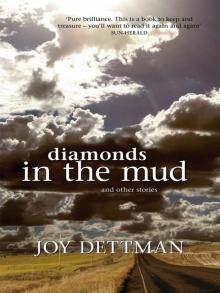 Diamonds in the Mud and Other Stories
Diamonds in the Mud and Other Stories Moth to the Flame
Moth to the Flame The Tying of Threads
The Tying of Threads Wind in the Wires
Wind in the Wires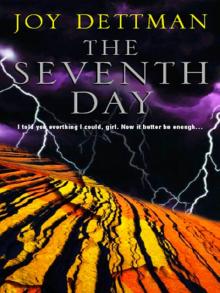 The Seventh Day
The Seventh Day Thorn on the Rose
Thorn on the Rose Jacaranda Blue
Jacaranda Blue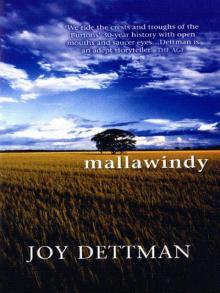 Mallawindy
Mallawindy Ripples on a Pond
Ripples on a Pond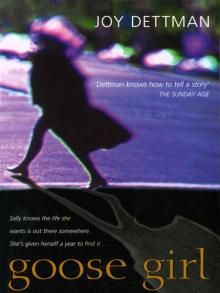 Goose Girl
Goose Girl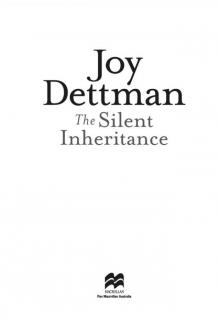 The Silent Inheritance
The Silent Inheritance Henry’s Daughter
Henry’s Daughter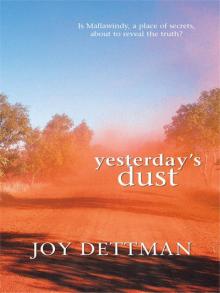 Yesterday's Dust
Yesterday's Dust Pearl in a Cage
Pearl in a Cage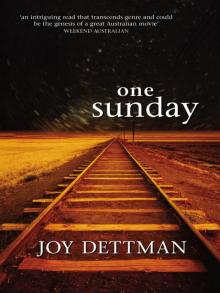 One Sunday
One Sunday